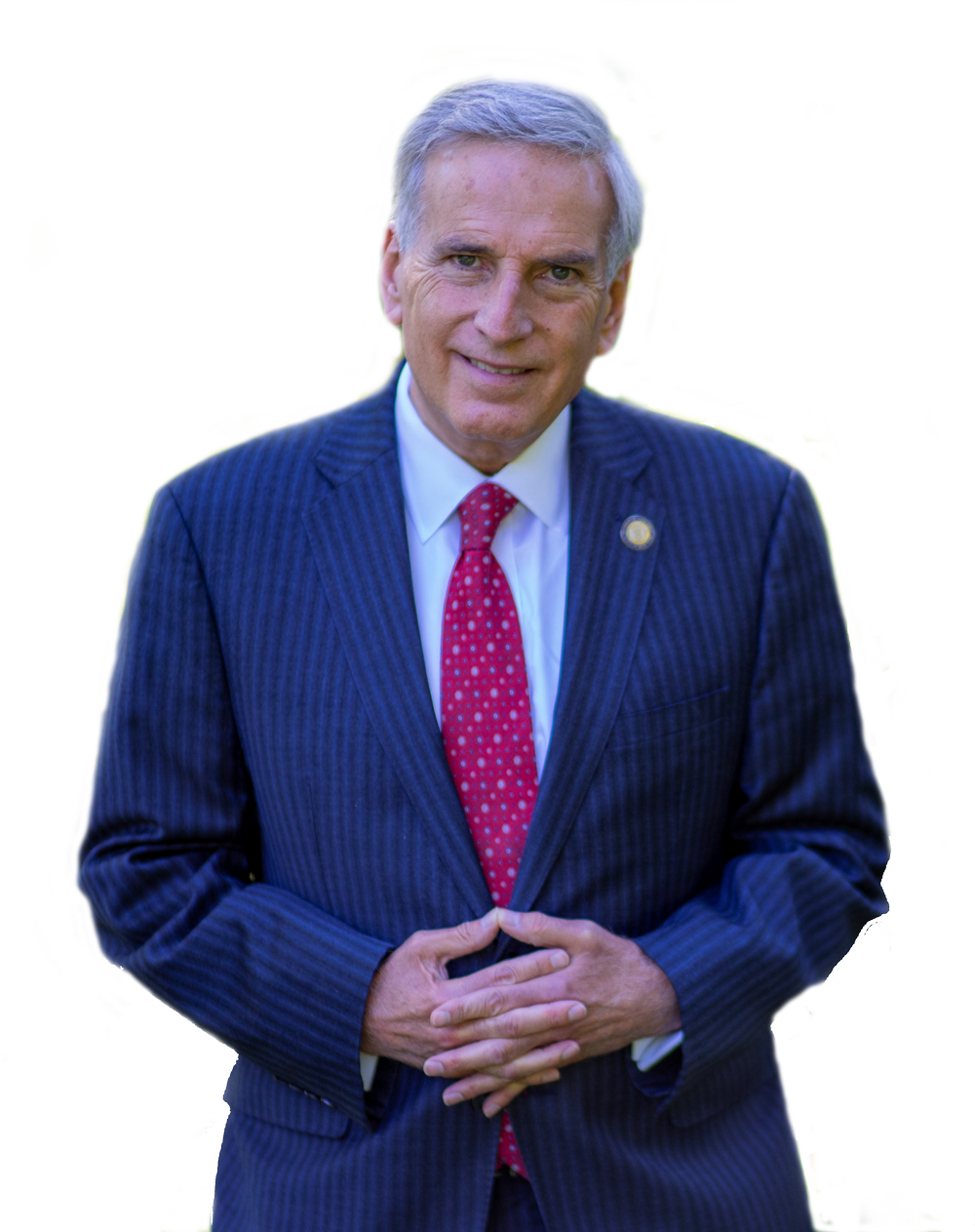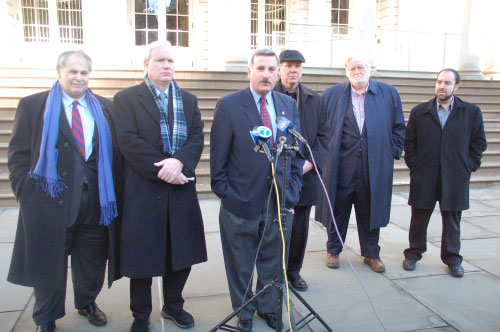Assemblyman David Weprin, Assemblyman Michael DenDekker, Senator Tony Avella and Business and Civic Leaders Denounce “Traffic Pricing”
Calls for alternatives
On Sunday, February 6, 2011, Assemblyman David I. Weprin (D-Queens) was joined by Assemblyman Michael DenDekker (D-Queens), State Senator Tony Avella (D- Queens), Mr. Carlo Scissura, Chief of Staff for Brooklyn Borough President Markowitz, Mr. Corey Bearak, representative for the Queens Chamber of Commerce, Walter McCaffrey, Primary Spokesperson for Keep NYC Free, and community and business groups on the steps of City Hall, regarding the potential reintroduction of congestion/traffic pricing in New York City.
In April 2007, Mayor Bloomberg proposed to charge drivers an eight (8) dollar fee for cars and commercial vehicles to enter Manhattan south of 60th Street on weekdays between 6 am to 6 pm as part of his PlaNYC 2030 initiative. Trucks would face a steeper twenty-one (21) dollar fee when entering the “congestion zone”. The plan met much opposition from political and civic leaders, as well as business owners and civilians who viewed the fees as an unfair tax on working and middle class families and small business owners.
As New York City Council Finance Committee Chair, now State Assemblyman, David I. Weprin, was a strong opponent of the congestion pricing plan.
“Not only would congestion pricing be detrimental to economic prosperity of small business owners, commuters, and working class families,” stated Mr. Weprin. “It would also negatively impact the environment, and consequently pose a public health risk to the residents of many outer borough neighborhoods that already see high levels of traffic and are major mass transit hubs.”
“The administration’s latest traffic pricing plan is nothing less than a disguised tax on all people of New York City. In this tough economic environment, when the good people of Queens are working harder than ever to make every last cent count, it’s unfair to charge New Yorkers a tax to enter part of their own city. Only through unity and solidarity will New York overcome its financial challenges. But this proposal doesn’t unite – it divides and then conquers residents of the outer boroughs,” said Assemblyman Michael DenDekker.
Advocates of congestion pricing claimed that congestion pricing would be beneficial to the environment, as fewer cars on the streets would decrease environmental pollutants. However, Mr. Weprin and others argued, charging a fee to enter Manhattan would not guarantee a reduction in the total number of cars being driven in all of New York City. Rather, it could simply just shift the traffic to other areas outside of Manhattan with greater access to mass transit. Already densely populated areas in Brooklyn, the Bronx, Queens, and Staten Island could see a huge influx of vehicular traffic creating greater congestion and thus resulting in higher rates of pollution in these areas.
“Five years ago, a Queens Chamber of Commerce-commissioned report found this proposal today called traffic pricing, "A Cure Worse than the Disease". This congestion tax remains a business killer and impacts unfairly on smaller businesses including the thousands of businesses and firms of all sizes who do business from and/ or in our vibrant borough,” said Jack Friedman, Executive Director, Queens Chamber of Commerce.
A 2007 report released by Mr. Weprin’s office as Finance Chair of the City Council illustrated that many mass transit hubs in the outer boroughs already have a high incidence of childhood asthma. It is believed that further exposure to pollutants in these areas, a potential by-product of congestion pricing, could only lead to more severe negative health consequences in this already at-risk population.
Recently, congestion pricing has resurfaced in the media with a new name – “traffic pricing.”
“Frankly, I am flabbergasted that talk of congestion pricing – or ‘traffic pricing’ as it’s now being called in some circles – has resurfaced. I am opposed to any proposal that discriminates against motorists from Brooklyn, especially drivers forced to travel to the Manhattan central business districts for medical reasons, as well as small businesspeople that depend on their vehicles for their livelihood. If the idea is to help fund mass transit, then I have proposed other viable solutions in the past, including a modest gasoline tax in the 12-county MTA region, a vehicle use tax or a lottery with all proceeds dedicated to mass transit. There has to be a more equitable plan that accomplishes our shared goals of cleaner air, reduced congestion and sufficiently funding our mass transit system,” stated Brooklyn Borough President Marty Markowitz.
"Traffic Pricing is nothing more than another unfair and unnecessary tax on the people residing outside of Manhattan," stated Senator Tony Avella. "Despite what the Bloomberg administration has been saying, 'Traffic Pricing' is simply 'Congestion Pricing' being spun in a different way. It is not a viable option or solution for reducing traffic; it is merely a revenue generating plan. The reality is that nobody drives into Manhattan for the fun of it. People drive because they need to drive. We can't allow this City and the MTA to continually balance their books on the backs of those who can least afford it," said Avella.
“No matter the name it is given, congestion pricing, traffic pricing, or any similar plan to tax those attempting to gain access to Manhattan would have the same negative impact on New Yorkers. This idea should not even be reopened for discussion.” stated Mr. Weprin. “It is time to look to alternative methods to reduce the undeniably problematic congestion in Manhattan.”

